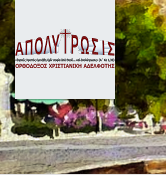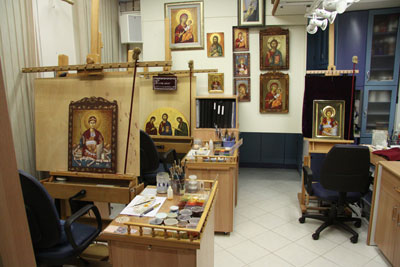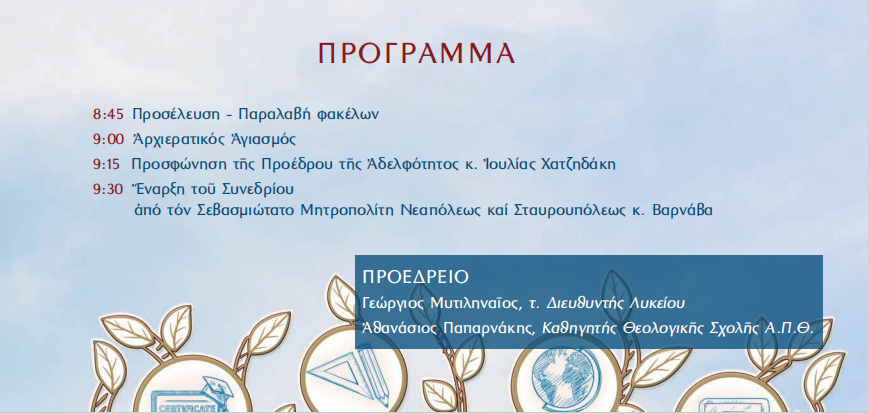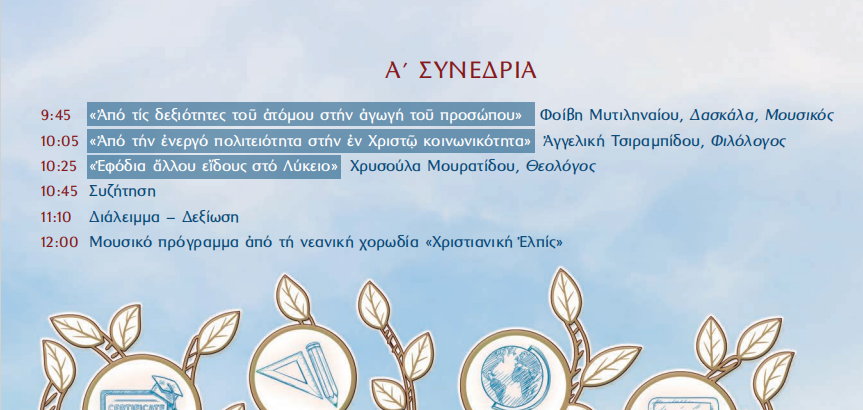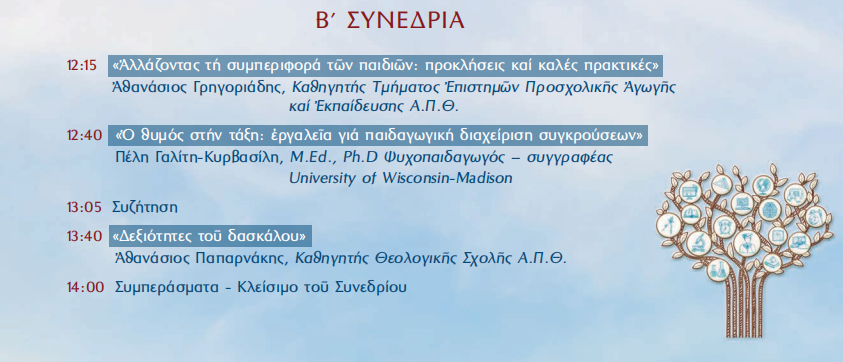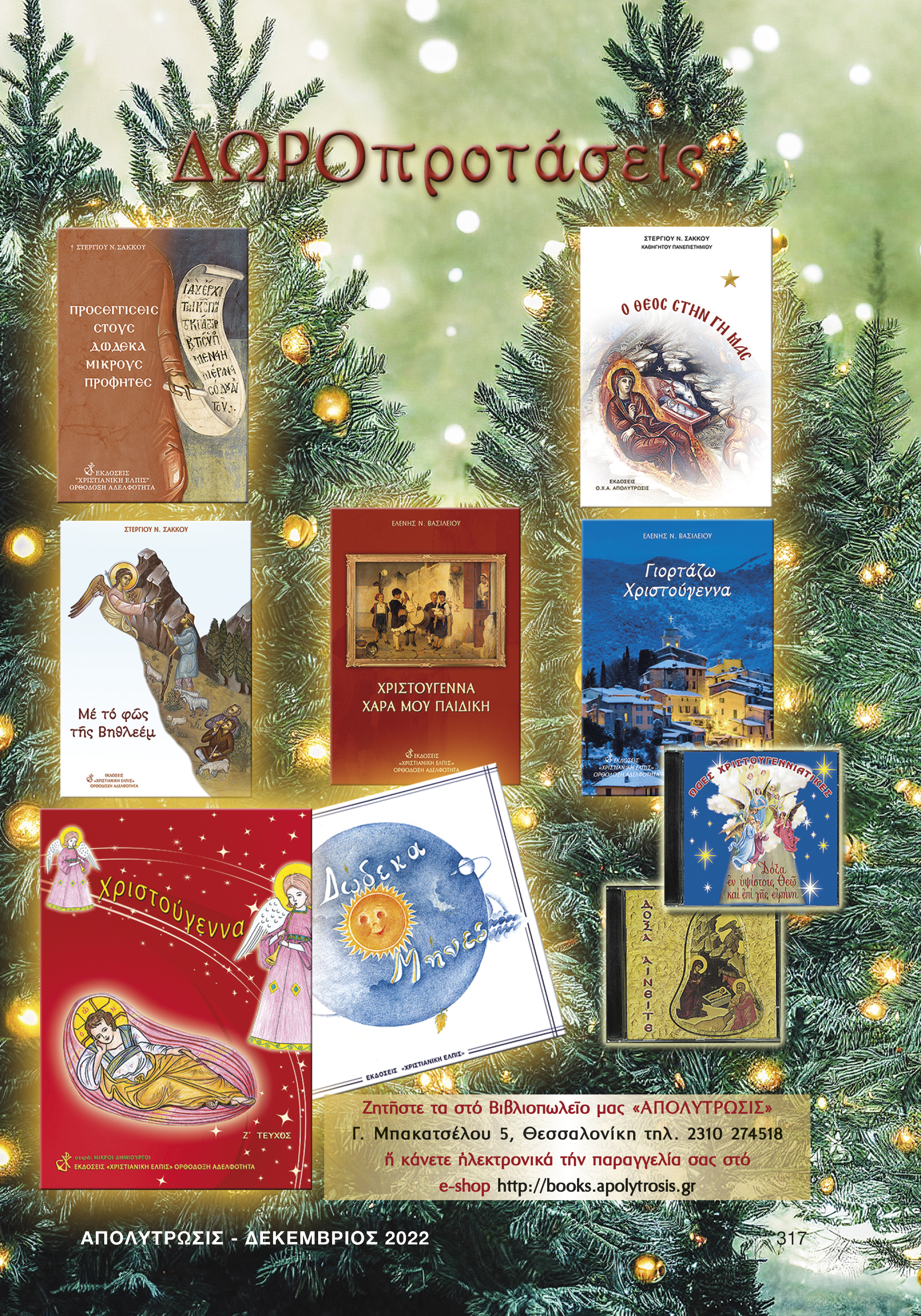 ΑΠΟΛΥΤΡΩΣΙΣ
ΧΡΙΣΤΙΑΝΙΚΗ ΟΡΘΟΔΟΞΗ ΑΔΕΛΦΟΤΗΣ
ΑΠΟΛΥΤΡΩΣΙΣ
ΧΡΙΣΤΙΑΝΙΚΗ ΟΡΘΟΔΟΞΗ ΑΔΕΛΦΟΤΗΣ
Super User
Ὕπνος: Ἕνα μαξιλάρι γιά τήν ὑγεία μας (Γ΄)
Ὑγιεινή τοῦ ὕπνου
 Ὁ ὑγιεινός ὕπνος, βασικός παράγοντας τῆς εὐεξίας γιά μικρούς καί μεγάλους, καθορίζεται μέ κριτήριο τόσο τήν ποσότητα (οὔτε ἐλάχιστος ὕπνος οὔτε πολύς) ὅσο καί τήν ποιότητά του (γρήγορη ἐπέλευση καί διατήρηση τοῦ ὕπνου κατά τή διάρκεια τῆς νύχτας).
Ὁ ὑγιεινός ὕπνος, βασικός παράγοντας τῆς εὐεξίας γιά μικρούς καί μεγάλους, καθορίζεται μέ κριτήριο τόσο τήν ποσότητα (οὔτε ἐλάχιστος ὕπνος οὔτε πολύς) ὅσο καί τήν ποιότητά του (γρήγορη ἐπέλευση καί διατήρηση τοῦ ὕπνου κατά τή διάρκεια τῆς νύχτας).
Ὅλοι μας κατά καιρούς δυσκολευόμαστε νά κοιμηθοῦμε, ὅταν ὅμως ἡ ἀυπνία ἐπιμένει, καθίσταται σοβαρό πρόβλημα. Δυστυχῶς, στόν σύγχρονο κόσμο οἱ διαταραχές τοῦ ὕπνου ἔχουν λάβει διαστάσεις ἐπιδημίας μέ ὅλες τίς συνέπειές της. Ποιές εἶναι οἱ αἰτίες τοῦ φαινομένου;
Κατ᾽ ἀρχάς πρέπει νά γνωρίζουμε ὅτι μέ τήν αὔξηση τῆς ἡλικίας γιά λόγους βιολογικούς ὁ ἀριθμός τῶν ὡρῶν ὕπνου τείνει νά μειώνεται.
Στό 10% ἕως 15% τῶν περιπτώσεων ἡ χρόνια ἀυπνία μπορεῖ νά συνδέεται μέ παθολογικές καταστάσεις, ὅπως ὁρμονικές (ἔμμηνος ρύση, ἐμμηνόπαυση), χρόνιες ἀσθένειες (καρκίνος, χρόνιος πόνος) ἤ νευρολογικές διαταραχές (ἄνοια, ἄπνοια ὕπνου, σύνδρομο ἀνήσυχων ποδιῶν). Στρεσογόνοι παράγοντες καί τό ἄγχος τῆς καθημερινῆς ζωῆς, οἱ συνθῆκες ἐργασίας, οἱ δυσκολίες (οἰκονομικές, ἐπαγγελματικές, κοινωνικές) ἀποτελοῦν ἐπίσης παράγοντες ἀυπνίας.
Ἐπιπλέον, ἡ κατανάλωση καφεΐνης καί ἀλκοόλ πιθανόν τροφοδοτεῖ τήν ἀυπνία. Ἀλλά καί οἱ καθημερινές δραστηριότητες καί συνήθειες, καθώς καί τό περιβάλλον τοῦ δωματίου πού κοιμόμαστε ἐνδέχεται νά ἐπηρεάσουν τόν ὕπνο μας κατά τή νύχτα.
Πῶς μποροῦμε νά ἀντιμετωπίσουμε τό πρόβλημα τῆς ἀυπνίας;
Ὑπάρχουν κάποιοι πρακτικοί τρόποι πού βοηθοῦν γιά ἕνα ὑγιεινό, ποιοτικό ὕπνο:
Ἡ δημιουργία ἑνός εὐχάριστου περιβάλλοντος σέ ἕνα δροσερό, σκοτεινό, ἤρεμο ὑπνοδωμάτιο μπορεῖ νά ἀποτελέσει πρόσκληση γιά χαλάρωση.
Ἐπειδή ἡ χρήση ὀθόνης (τηλεόραση, κινητά τηλέφωνα, tablet, φορητοί ὑπολογιστές) προκαλεῖ διέγερση τοῦ ἐγκεφάλου, πρέπει νά ἀποφεύγεται 1 ἕως 2 ὧρες πρό τοῦ ὕπνου.
Νά μήν ἀλλάζουμε συχνά τό βιολογικό μας ρολόι. Θά πρέπει νά ἀκολουθοῦμε καθημερινά -ἀκόμα καί τά Σαββατοκύριακα- σταθερή ὥρα πρωινοῦ ξυπνήματος καί ὕπνου.
Εἶναι ζωτικῆς σημασίας νά ἀντιμετωπίζεται ὁ ὕπνος ὡς προτεραιότητα καί νά μήν τόν θυσιάζουμε στόν βωμό τῆς ἐργασίας, τῆς κοινωνικότητας, τῆς ἄσκησης, τῶν ἀπολαύσεων. Ἄν χρειάζεται νά γίνουν ἀλλαγές στίς ὧρες τοῦ ὕπνου, αὐτό πρέπει νά γίνει σταδιακά.
Ὁ ὕπνος τῆς ἡμέρας, ἄν εἶναι μεγάλης διάρκειας, μπορεῖ νά διαταράσσει τόν βραδινό ὕπνο καί δέν μπορεῖ νά τόν ἀντικαταστήσει. Γιά τόν λόγο αὐτό ὁ μεσημεριανός ὕπνος δέν πρέπει νά ὑπερβαίνει τό ἡμίωρο.
Ἕνα γρήγορο καθημερινό περπάτημα καί γενικῶς ἡ σωματική ἄσκηση ἐνισχύει τήν ἐπίδραση τῶν φυσικῶν ὁρμονῶν καί τήν καλή διατήρηση τοῦ βιολογικοῦ μας ρολογιοῦ, ἀρκεῖ νά μή γίνεται πολύ κοντά στήν ὥρα τοῦ ὕπνου.
Ἐπιπλέον, ἡ πρόσληψη βραδινοῦ φαγητοῦ πρέπει νά ἀπέχει 2-3 ὧρες ἀπό τόν ὕπνο. Ἡ ἀποφυγή βαριῶν καί ἐρεθιστικῶν τροφῶν, νικοτίνης, ἀλκοόλ καί καφέ πρίν ἀπό τόν ὕπνο βοηθάει σέ ἕναν καλό ὕπνο.
Τέλος, ἡ πεποίθηση ὅτι ὁ ἄνθρωπος βρίσκεται κάτω ἀπό τή στοργική πρόνοια καί ἀγάπη τοῦ Θεοῦ, ὁ ὁποῖος ποτέ δέν κοιμᾶται καί πάντα ἀγρυπνεῖ γιά μᾶς, ἀποτελεῖ τό καλύτερο καί καταλληλότερο ὑπναγωγό, χωρίς καμιά παρενέργεια.
Ὁ Θεός εἶναι μαζί μας καί τή νύχτα καί τήν ἡμέρα, κι ὅταν κοιμόμαστε κι ὅταν εἴμαστε ξύπνιοι. Ἔτσι ἀκόμη καί ἡ ἀυπνία, ὅταν δέν εἶναι μόνιμη καί παθολογική (ὁπότε χρειάζεται ἰατρική παρέμβαση), μπορεῖ νά μετατραπεῖ σέ ἀγρυπνία καί σέ ἐντρύφηση στά μεγαλεῖα τοῦ Θεοῦ, παρέχοντας μεγάλη πνευματική ὠφέλεια.
Ἅγιοι ἄνθρωποι συνήθιζαν νά ἐκμεταλλεύονται τήν ἡσυχία τῆς νύχτας γιά μιά ἀπερίσπαστη ἐπικοινωνία μέ τόν Θεό. «Πόσες φορές σέ θυμήθηκα στό στρῶμα μου», λέει ὁ Δαβίδ, «κι ἀπό τόν ὄρθρο σέ εἶχα στή σκέψη μου, Κύριε!» (βλ. Ψα 62,7). «Κατά τή διάρκεια τῆς ἡμέρας», σημειώνει ὁ ἅγιος Χρυσόστομος, «ἔρχονται στόν νοῦ καί ἄλλες φροντίδες καί θόρυβοι, κι ἀπομακρύνουν τόν Θεό ἀπό τή σκέψη μας. Τή νύχτα ὅμως μποροῦμε νά Τόν θυμόμαστε διαρκῶς, τότε πού ἡ ψυχή γαληνεύει καί ἀναπαύεται σάν σέ ἤρεμο λιμάνι». Τήν ψυχική ὠφέλεια τοῦ πιστοῦ ἀπό τή νυχτερινή προσευχή παρομοιάζει ὁ ἅγιος Παΐσιος μέ τή νυχτερινή σιωπηλή βροχή, πού πολύ ὠφελεῖ στήν ἀνάπτυξη τῶν φυτῶν. Μέ αὐτή τήν ἐμπειρία καί ὁ ἅγιος Πορφύριος ὁ Καυσοκαλυβίτης συνιστοῦσε: «Ἀκόμη καί τυχαῖα νά ξυπνήσεις τή νύχτα, μήν ξανακοιμηθεῖς ἀμέσως. Εἶναι μιά εὐκαιρία πού σοῦ δίνει ὁ Θεός νά προσευχηθεῖς ὅσο μπορεῖς μές στήν ἡσυχία».
Γεωργία Δερετζῆ, Νευρολόγος
"Ἀπολύτρωσις", Νοέμβρ. 2025
ΜΙΛΩ ΣΤΟΝ ΘΕΟ
ΜΙΛΩ ΣΤΟΝ ΘΕΟ
 Προσευχητάριο γιά παιδιά νηπιακῆς καί προσχολικῆς ἡλικίας.
Προσευχητάριο γιά παιδιά νηπιακῆς καί προσχολικῆς ἡλικίας.Saint Dimitrios, The Catechist of Thessaloniki
Translated excerpts from the book:
Στεργίου Ν. Σάκκου [Read CV], Ὁ Κατηχητής τῆς Θεσσαλονίκης, ἐκδ. «ΧΡΙΣΤΙΑΝΙΚΗ ΕΛΠΙΣ» ΟΡΘΟΔΟΞΗ ΑΔΕΛΦΟΤΗΤΑ, Θεσ/νίκη 2000
Homily of Saint Gregory Palamas, On the Great Martyr, the Wonderworker, and the Myrrh-Streaming Dimitrios
His Ornament Was Faith
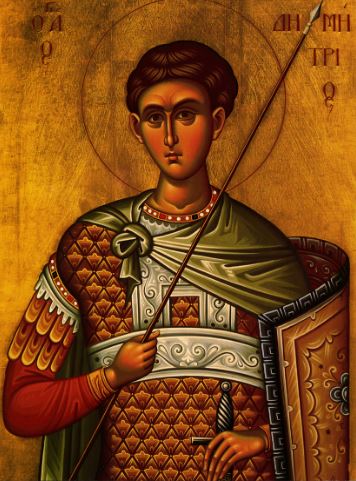
And what praise could be offered to Dimitrios—the one who adorns not only the whole world but even the heavens themselves? What, then, is his own ornament?
♦ His unconquerable faith.
♦ His measureless grace.
♦ The divine and enduring wealth of heavenly virtues, now stored above and added to the treasures of heaven as one more priceless jewel.
Even while he still lived among men, Dimitrios was already reaching toward heaven. He became himself a part of its eternal riches—a beauty belonging both to all the world and to the one beyond.
Foreseeing this, David blessed and exalted him, saying: “Blessed is the man who walks not in the counsel of the wicked, nor stands in the way of sinners” (Ps 1:1). He never allowed a single thought to enter his mind that was not devout. He never took a single step in a way displeasing to God. He kept pure and undefiled the grace he had received through Baptism in Christ. His will was perfectly attuned to the law of the Lord. It was for him the very book of God itself—like a tablet divinely inscribed, or like those stones written by the finger of God and set before all for their common good.
Beauty, Wisdom, and Purity
In the words of Isaiah, “Before the child knows how to refuse the evil and choose the good, he will refuse the evil, to choose the good” (Is 7:16). In the same way, Dimitrios, even in the bloom of youth, embraced the beauty of virginity. He devoted himself wholly to this treasure. He did all things to remain pure both in body and in soul. His way of life was already in heaven, even while his body still lived on earth. He advanced in likeness to the bodiless angels. In this struggle, all the other virtues stood beside him as companions, and above all the love to study the wisdom. Through discernment and purity he reached perfection. In a short time he brought to his youth the venerable maturity of old age. As Solomon teaches, “Understanding is gray hair to men, and a blameless life is ripe old age” (Wis of Sol 4:9).
He was, therefore, a gentle young man, radiant with beauty—not only outwardly and to the senses, but even more in the hidden depths of his soul. God, who looks upon the heart, beheld him and loved the spiritual and invisible beauty within him. He was pleased to dwell in him, to become one spirit with him, and to make him divine in every way. God once found David to be a man after His own heart. But Dimitrios, though still very young and not yet counted among the mature in years, He found exactly as His heart desired (see Acts 13:22)—“a workman who has no need to be ashamed” (2 Tim 2:15), one who fulfilled His commandments. God found in him, as Paul writes, “a chosen vessel to bear My name before the Gentiles and kings” (Acts 9:15). And, according to the Wisdom of Solomon, “a spotless mirror” (Wis of Sol 7:26), He received and reflected the transcendent and ineffable beauty.
I have heard that to him also that voice was revealed in secret: “Behold My servant, whom I have chosen, My beloved, in whom My soul is well pleased; I will put My Spirit upon him, and he shall proclaim justice to the nations” (see Is 42:1; Mt 12:18). He would transform others, making the unworthy worthy, so that he might be, as it is written, “as My mouth” (Jer 15:19). Others he would rebuke and bring to shame, showing them to be “vessels of wrath made for destruction” (Rom 9:22). And though these words were written concerning Christ, it is understood that through Him they are also bestowed upon those who live in perfect imitation of His example.
ΙΣΤ΄ ΕΚΠΑΙΔΕΥΤΙΚΟ ΣΥΝΕΔΡΙΟ
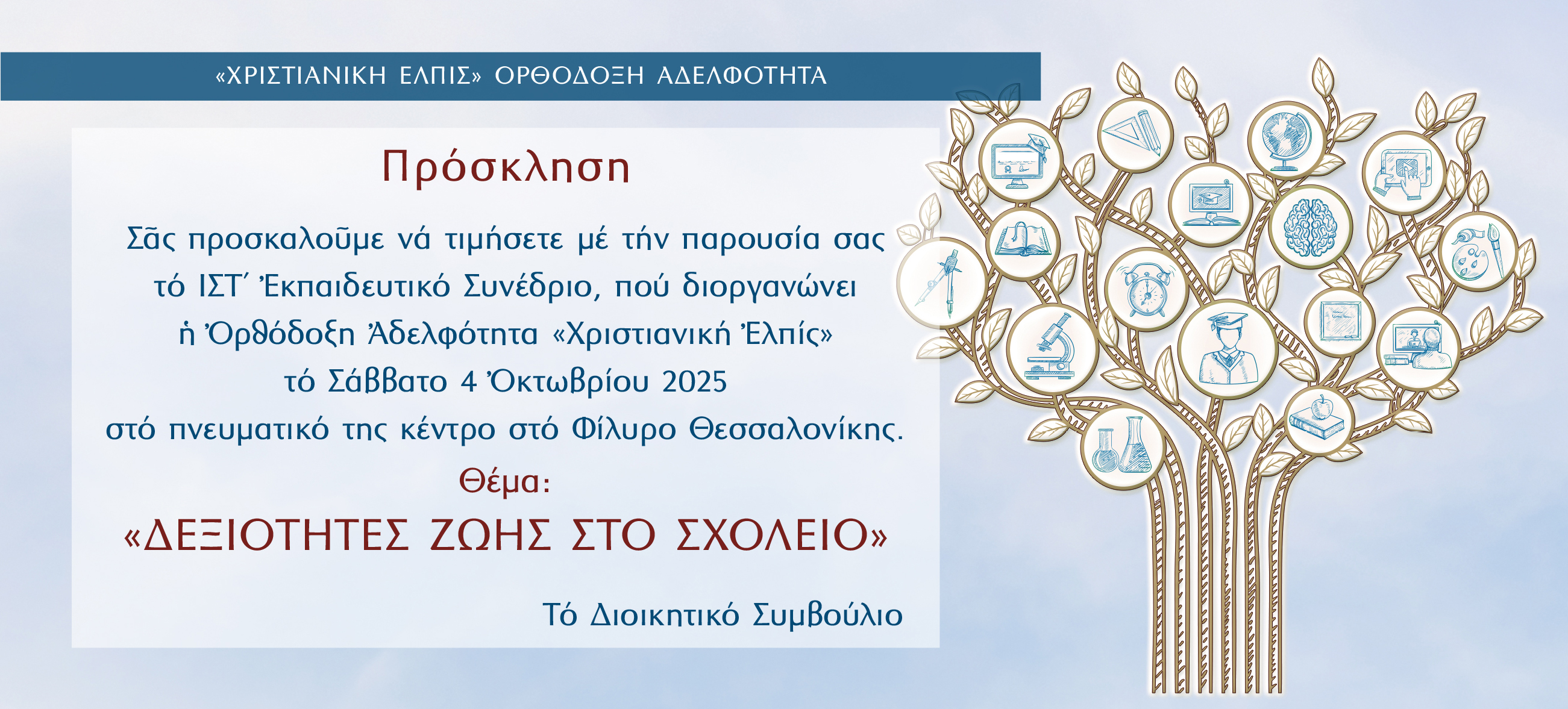
Ζητεῖται δάσκαλος
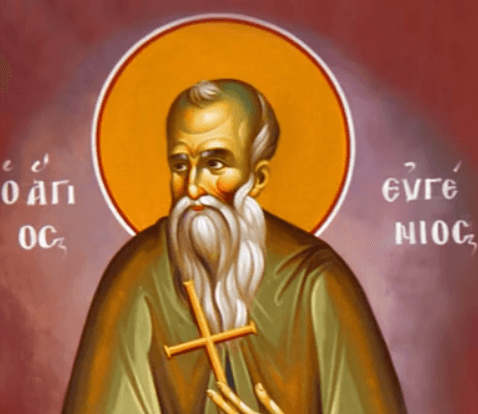 Μιά χαρισματική ἐκκλησιαστική καί πνευματική προσωπικότητα, στυλοβάτης τοῦ Ἔθνους καί τῆς Ἐκκλησίας, ἀκτινοβολεῖ στά μαῦρα χρόνια τῆς Τουρκοκρατίας. Λόγιος, ἱερωμένος, συγγραφέας, φωτισμένος διδάσκαλος τοῦ Γένους εἶναι ὁ ἅγιος Εὐγένιος Γιαννούλης ὁ Αἰτωλός (1595-1682), πού τή μνήμη του τιμοῦμε παραμονή τῆς Μεταμορφώσεως τοῦ Σωτῆρος, στίς 5 Αὐγούστου.
Μιά χαρισματική ἐκκλησιαστική καί πνευματική προσωπικότητα, στυλοβάτης τοῦ Ἔθνους καί τῆς Ἐκκλησίας, ἀκτινοβολεῖ στά μαῦρα χρόνια τῆς Τουρκοκρατίας. Λόγιος, ἱερωμένος, συγγραφέας, φωτισμένος διδάσκαλος τοῦ Γένους εἶναι ὁ ἅγιος Εὐγένιος Γιαννούλης ὁ Αἰτωλός (1595-1682), πού τή μνήμη του τιμοῦμε παραμονή τῆς Μεταμορφώσεως τοῦ Σωτῆρος, στίς 5 Αὐγούστου.
Πρωτοαντίκρισε τό φῶς τοῦ ἥλιου στό Μέγα Δένδρο Αἰτωλίας, ἕνα χωριό ξακουστό, ἀφοῦ γέννησε ἀργότερα κι ἕναν ἄλλο ἅγιο, τόν Κοσμᾶ τόν Αἰτωλό, τόν ἀπόστολο τοῦ σκλαβωμένου Γένους.
Σπουδαγμένος ὁ Εὐγένιος κοντά σέ ὀνομαστούς δασκάλους, ἀλλά καί φορτωμένος μέ τόν πόνο γιά τήν ἀμάθεια τῶν σκλάβων Ἑλλήνων ρίχτηκε στήν περιπέτεια γιά τήν ἵδρυση σχολείων, ἀνοικοδόμηση ναῶν, ἀνέγερση οἰκοτροφείων γιά τούς ἄπορους σπουδαστές... Παρόλα τά ἐμπόδια σ᾽ ἐκεῖνα τά μαῦρα χρόνια δημιουργεῖ ὑποδομές, γιά νά φέρει τόν ραγιά σ’ ἐπαφή μέ τό θαυμαστό ὁπλοστάσιο τῆς γνώσης. Στήν Ἄρτα, στό Αἰτωλικό, στό Μεσολόγγι, στήν ἄγονη περιοχή τῶν Ἀγράφων στό Καρπενήσι καί στά Βραγγιανά τῆς Εὐρυτανίας ἀνάβει τούς πυρσούς τῆς παιδείας καί διαλύει τά σκοτάδια τῆς ἄγνοιας. Μιά πνευματική ἀναγέννηση συντελεῖται, καθώς διδάσκει μέ παροιμιώδη ὑπομονή, κατηχεῖ, συγγράφει, ἀλληλογραφεῖ. Ἡ βιοτή καί τό καρποφόρο ἔργο του ἀποπνέουν ἄρωμα γνήσιας ὀρθόδοξης πίστης καί βαθιᾶς ἑλληνομάθειας. Συνάζει πλούσια σοδειά. Παραλαμβάνουν τή σκυτάλη διαπρεπεῖς μαθητές του, ὅπως ὁ μεγάλος διδάσκαλος τοῦ Γένους, ὁ ἅγιος Ἀναστάσιος Γόρδιος.
Καθώς ὁ Σεπτέμβρης δρασκέλισε ἤδη τό κατώφλι μας καί ἄνοιξαν οἱ πύλες τῶν σχολείων νά ὑποδεχτοῦν τά σχολιαρόπαιδα, διπλοστοχάζομαι: Ποιός, στά πέτρινα αὐτά χρόνια, θά σταθεῖ ὁλόρθος στό βάθρο τῆς σχολικῆς ἕδρας καί μέ πυρωμένο βλέμμα καί πυρφόρα καρδιά θά μεταδώσει γνώσεις, μά συνάμα θά φυτέψει κι ἀρετές στίς ψυχές τῶν μαθητῶν μας πού ἀγρίεψαν; Ποιός θά τούς ἐνσταλάξει τά λησμονημένα διαχρονικά ἰδανικά τῆς φυλῆς μας; Ἀναζητῶ σήμερα μέ τό φανάρι τοῦ Διογένη τόν ὀρεξάτο, τόν γεμάτο ἀγάπη δάσκαλο, πού μ’ ἔμβλημα τήν πλατωνική ρήση «πᾶσά τε ἐπιστήμη χωριζομένη δικαιοσύνης καὶ τῆς ἄλλης ἀρετῆς πανουργία, οὐ σοφία φαίνεται» θά σπείρει βαθιά. Προσδοκοῦμε ἀπό τούς χριστιανούς δασκάλους καί παιδαγωγούς νά ἐμπνεύσουν, νά ἐμφυσήσουν ὁράματα καί νά βοηθήσουν μέ τή χάρη τοῦ Θεοῦνά ξεσκλαβωθοῦν τά νιάτα μας ἀπό καθετί τυραννικό. Εἶναι κατεπείγουσα ἀνάγκη!
"Ἀπολύτρωσις", Αὔγ.-Σεπτ. 2025
Ο ΣΤΑΥΡΟΣ ΣΤΟ ΦΩΣ ΤΗΣ ΑΝΑΣΤΑΣΗΣ
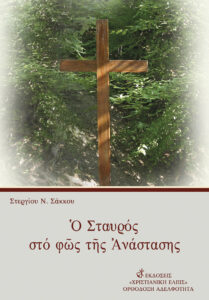
Ὁ Σταυρός τοῦ Κυρίου, λαμπρυσμένος ἀπό τό φῶς τοῦ κενοῦ μνήματος, ἔγινε τό σύμβολο τοῦ θριάμβου πάνω στήν δύναμη τοῦ κακοῦ.
ΖΗΤΗΣΤΕ ΤΟ ΣΤΟ ΒΙΒΛΙΟΠΩΛΕΙΟ "ΑΠΟΛΥΤΡΩΣΙΣ", Γ. ΜΠΑΚΑΤΣΕΛΟΥ 5, ΤΗΛ. 2310 274518
ἤ μπεῖτε στό ἠλεκτρονικό μας Βιβλιοπωλεῖο
The Cross and the Gospel
Translated excerpts from the book:
Στεργίου Ν. Σάκκου [Read CV], Ὁ Σταυρός στό φῶς τῆς Ἀνάστασης, ἐκδ. «ΧΡΙΣΤΙΑΝΙΚΗ ΕΛΠΙΣ» ΟΡΘΟΔΟΞΗ ΑΔΕΛΦΟΤΗΤΑ, Θεσ/νίκη 2019
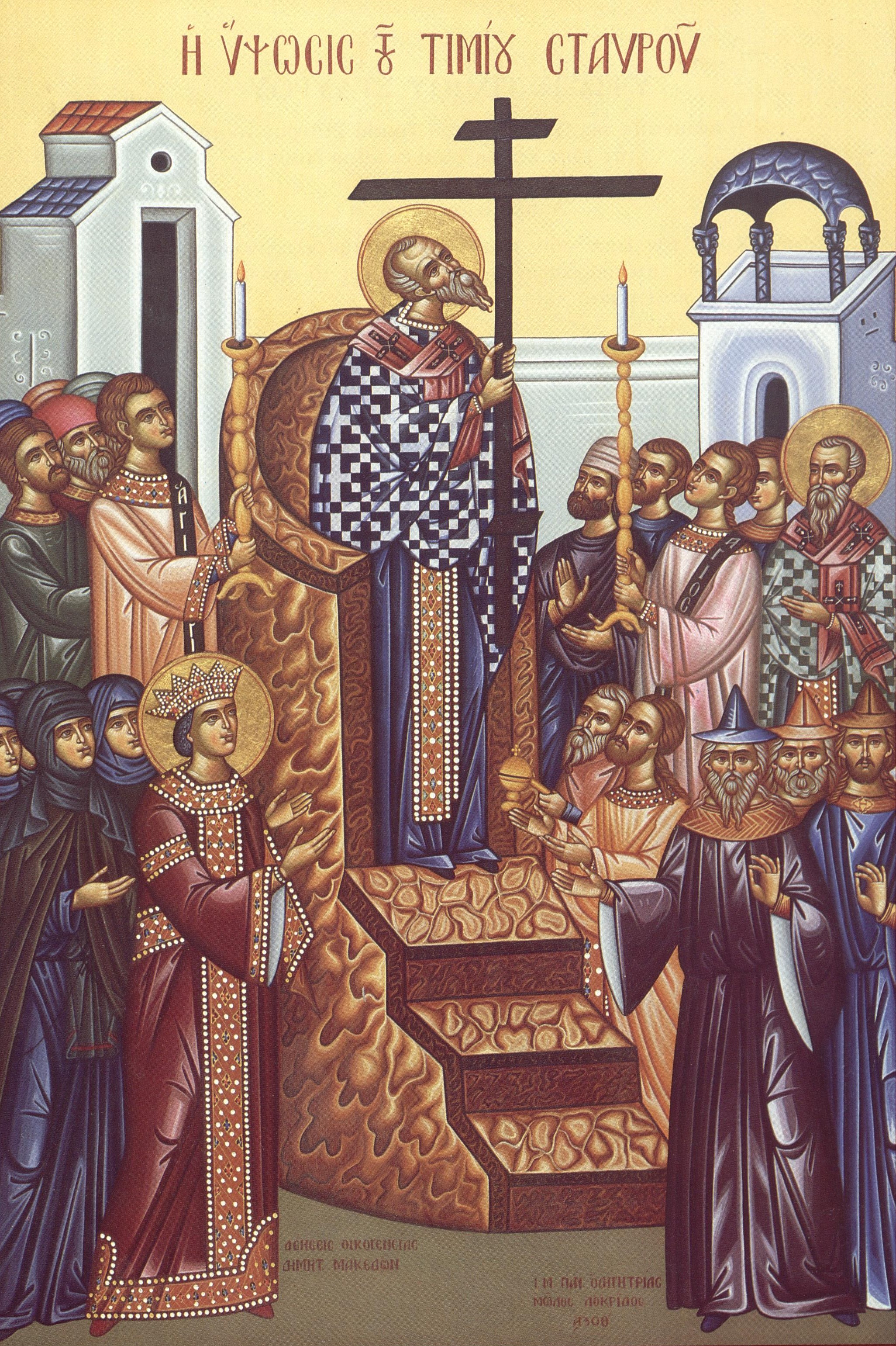 The universal Exaltation of the Precious Cross (September 14) proclaims the rejoicing of the whole created world, the redemption and happiness of every believer. It signifies what is most joyful and good—indeed, it conveys what the very word “gospel” means.
The universal Exaltation of the Precious Cross (September 14) proclaims the rejoicing of the whole created world, the redemption and happiness of every believer. It signifies what is most joyful and good—indeed, it conveys what the very word “gospel” means.
Yet, when we look back through history, we see that in the time before Christ the cross carried a completely different, dreadful, and terrifying meaning. It was the instrument of the most painful and shameful condemnation, the symbol of the dominion of evil, the curse, the banner and the trophy of the devil. No one could have dared—not only to assert, but not even to conceive—a connection or kinship of the cross with anything good and joyful.
How then did this inconceivable change take place—the transformation of the cross and its identification with the gospel? This unimaginable achievement is the work of the love, the wisdom, and the power of God. With a bold leap, God descends from heaven into the earth, into the realm of the “ruler of this world,” and seizes his dominion. He shatters his kingdom and sets free the captives held in bondage to Satan. As Jesus Christ is lifted up as the last of the condemned on Golgotha, He accomplishes the complete crushing of the adversary, the devil. The apostle Paul records in simple words the offering of Jesus Christ through the cross: “When he ascended on high he led a host of captives” (Eph 4:8). He made the captives of the ruler of this world His own, and as Lord He now raises the cross as His banner, His own flag. The God-man is now the Victor!
Of course, the above holds true only for those who confess Jesus Christ as God and accept to cooperate with Him through repentance. For the others, who willfully remain far from Christ and from His redeeming work, all this is meaningless. It is understandable, then, that they fill their daily lives with countless other symbols, while at the same time opposing and seeking to abolish the symbol of the cross.
Jesus Christ reveals to the world the cause of joy, the gospel, the blessed secret of God. It is the cross! Yes, the cross that is accompanied by pain, suffering, blood, and death. The gospel does not mean merely good words or moral teaching. It signifies the event of Jesus Christ, the condescension of God, who descends to earth in order to experience pain in its most agonizing form; He endures a series of humiliations, so that He might be nailed upon the cross as “obedient unto death, even death on a cross” (Phil 2:8). All of this, along with the teaching and preaching of Jesus Christ, is what Paul refers to as the gospel of glory. The truths of the gospel shine forth and illumine the world, and their light reveals the inexhaustible light, the Sun of Righteousness, the incarnate God, whose life is marked by the cross. For this very reason the cross is no longer disgrace and curse, but honor and glory, resurrection.
Of course, in the apostolic age the gospel had not yet taken shape as the written book we know today, nor had the cross yet come to prevail as a visible sign. This came later, when the body of the twenty-seven books of the New Testament was compiled, and correspondingly the symbol of the cross was established. Thus, when the holy apostles speak of the gospel, they mean the event of salvation. Likewise, they call the cross the crucified Lord.
Cross and gospel are identified as two sides of the same coin. The apostle Paul experiences this in a very practical way, for the gospel (see Rom 2:16) is his daily concern and the breath of his life, while at the same time he bears in his body “the marks of the cross” (cf. Gal 6:17). And our holy Church bears witness to this in visible form through the holy Gospel, which rests upon her sacred altar; on the one side it bears the cross, and on the other the resurrection. In this way it shows that the fearful suffering of the cross is the guarantee of the supreme joy of the resurrection.
This must be especially emphasized in our pleasure-seeking age, which absolutely rejects the cross or deceitfully distorts its essence; in every way it seeks to make our life painless, carefree, and free from all suffering. For this reason, today more than ever, we are unfamiliar with and untouched by true joy. Joy remains inaccessible, and the gospel fruitless and of no benefit, when the cross is “emptied,” when it loses its content. And what is the content of the cross? It is Christ Himself, His gospel. On the cross, as on a hard disk, the entire life and offering of the God-man is stored. When the Christian becomes alienated from this, he empties the Cross. The practical implications of this I will present with a series of images.
◆ The cross is the rod and the staff, our support for a secure journey along the way of God. With its strength we carry out the will of the Lord willingly and joyfully, and then “his commandments are not burdensome” (1 Jn 5:4). Without the cross, they seem impossible to us.
◆ The cross is the elevator that lifts us into the glory of God; if the elevator breaks down, we will never ascend, never experience the joy of the gospel.
◆ The cross is the umbrella that shields us from the rain of the devil; if the umbrella is pierced, it loses its protective function, and with it the joy of Christ disappears from our life.
◆ The cross is the cloak that warms us with the love of God. Without its help, unbelief chills us.
◆ The cross is the treasury that contains the precious treasure of our salvation, the vessel of myrrh in which is stored the “inexhaustible myrrh,” the “fragrance of Christ.” If we empty the treasury or the vessel of myrrh, it is of no benefit to us.
◆ The cross is a “weapon against the devil,” the missile with which we crush him. But if the missile remains unused, or if through clumsy handling it explodes in our hands, our very life is endangered. This is what happens when we do not make the sign of the cross correctly.
The cross of Christ, stained with His immaculate blood and illumined by His glorious Resurrection, stands as the decisive crossroads where two paths meet: the road to heaven and the road that leads to the ends of the earth. With the unshakable foundation of Jesus Christ, the cornerstone upon which the Church is built, the faithful overcome the attraction of the world; “they take part in everything as citizens, and they endure everything as strangers.” At the same time, they embrace all people with a love unknown and without precedent, a love whose distinguishing mark is sacrifice. This is precisely what the commandment of Christ means: “Love one another as I have loved you” (Jn 13:34). Here lies the crucial point, where the great danger lurks: as love spreads out to all, it must not wrong the holy foundation, must not empty the cross of Christ, must not distort the Orthodox faith.
Just as Jesus Christ, “without departing from His nature, partook of our human substance,” Christ became man without ceasing to be God, so also we must love everyone—yet without falsifying the faith, without defiling the doctrine, without being moved away from the foundation of the cross. Then we truly honor it and partake of the joy that the cross has poured out upon the world; we enjoy the gifts that He bestows upon our life.
The Sign of the Cross
Translated excerpts from the book:
Στεργίου Ν. Σάκκου [Read CV], Ὁ Σταυρός στό φῶς τῆς Ἀνάστασης, ἐκδ. «ΧΡΙΣΤΙΑΝΙΚΗ ΕΛΠΙΣ» ΟΡΘΟΔΟΞΗ ΑΔΕΛΦΟΤΗΤΑ, Θεσ/νίκη 2019
If someone were to tell us that we could hold God in the palm of our hand, we would likely consider it an exaggeration—perhaps even a blasphemy. How could the Infinite and Eternal One be confined within the grasp of five fingers? And yet, the One who surpasses time and space took on flesh and bones in the womb of a Virgin. He showed us how He can dwell with His body and blood in the very heart of a human being. His supreme condescension to our human nature is revealed time and again in the life of the Church. It gives us the assurance to accept this truth with confidence. Yes, it is true. He who holds the universe in His hands and directs life and history by His providence, allows Himself to be embraced in the palm of a faithful Christian. Through the sign traced with the right hand, we make our Christian confession.
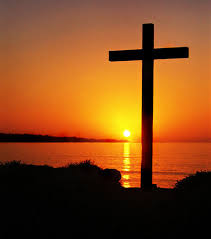 Speaking of the great mystery of faith—the Incarnation and the Resurrection of Christ—the apostle Paul speaks with clarity. Τhis wondrous work of God is fulfilled. It moves from being a historical reality to becoming a present reality in our lives. And it is accomplished through a “word”. A single utterance holds all its power: “the word of faith.” “But the righteousness based on faith says, Do not say in your heart, 'Who will ascend into heaven?' (that is, to bring Christ down) or 'Who will descend into the abyss?' (that is, to bring Christ up from the dead). But what does it say? 'The word is near you, on your lips and in your heart' (that is, the word of faith which we preach); because, if you confess with your lips that Jesus is Lord and believe in your heart that God raised him from the dead, you will be saved” (Rom 10:6–9). Our salvation depends on a confession made in faith. And God Himself is marked by a sign made in faith: the sign of the Cross.
Speaking of the great mystery of faith—the Incarnation and the Resurrection of Christ—the apostle Paul speaks with clarity. Τhis wondrous work of God is fulfilled. It moves from being a historical reality to becoming a present reality in our lives. And it is accomplished through a “word”. A single utterance holds all its power: “the word of faith.” “But the righteousness based on faith says, Do not say in your heart, 'Who will ascend into heaven?' (that is, to bring Christ down) or 'Who will descend into the abyss?' (that is, to bring Christ up from the dead). But what does it say? 'The word is near you, on your lips and in your heart' (that is, the word of faith which we preach); because, if you confess with your lips that Jesus is Lord and believe in your heart that God raised him from the dead, you will be saved” (Rom 10:6–9). Our salvation depends on a confession made in faith. And God Himself is marked by a sign made in faith: the sign of the Cross.
By joining the three fingers of our right hand into one, we signify the three persons of the Holy Trinity: the Father, the Son, and the Holy Spirit. Being of one essence, they are the one God. By folding the other two fingers together and placing them side by side, we declare the two natures that are united without confusion and without division in the person of our Lord, the God-man. Then, by tracing the sign of the Cross upon our body—with the hand on the forehead, the belly, the right shoulder, and the left—we recall the means of our salvation: the crucifixion of Christ. Through His Cross, He granted to humanity the resurrection of the dead bodies and to the Church the glory of the deification of her members. At the same time, we declare that we are crucified with the Lord, as members of His Body. In this simple act, the highest dogmas of our faith are expressed: the Trinitarian doctrine and the Christological doctrine. These are the very truths on which the ecumenical Councils of our God-inspired Fathers reflected and gave their verdict. The experienced elder and the unlearned child, the wise scholar and the humble laborer—all alike can confess the truths of the faith in this way, so long as they are Orthodox believers. And before these truths, even the angels stand in awe.
The sign of the Cross is rooted in the treasury of the Orthodox tradition, and it retains its meaning only when traced according to the way it has been handed down through the centuries. Above all, of course, it is connected with faith. It is neither an external form nor a magical symbol, but a confession of a particular faith and an invocation of a personal God. We acknowledge that God is Triune and we seek the grace that flows from the Cross of the Incarnate Lord. The immediate consequence is that it must be traced properly, fully, and completely. The hurried and careless manner that distorts its form so that it no longer resembles the Cross is unacceptable, for it reveals the absence of the most essential element: awareness and understanding. Even if we do everything correctly, but in the end neglect to complete the sign by placing our hand properly on the left shoulder, then our Cross has no validity. This is taught to us beyond any doubt by the posture of Moses’ prayer at the time when the Israelites fought against the Amalekites. As long as he kept his hands stretched wide, forming with his body the shape of a complete cross, the Israelites prevailed. But when he began to grow weary and his hands drooped and fell, changing the shape, the Israelites were defeated—even though Moses, with all his heart, continued to pray fervently. Aaron on one side and Hur on the other came to support his arms, holding them outstretched in the perfect likeness of the Cross, until the Israelites at last gained the victory. Even the slightest deviation causes the sign to lose its meaning. It’s like dialing a phone number and mistaking just one digit—one small error is enough to prevent the person you are looking for from ever answering. And could this not be the very reason we so often complain that God does not hear our prayers?
It is remarkable that one of the great missionaries of the Church, Saint Kosmas of Aetolia, persistently taught during the difficult years of the Turkish occupation that Christians should make the sign of the Cross correctly. For indeed, the Ark was for Israel the place where the symbols of the Covenant were kept. The holy Altar tabernacle (artophorion) is for the Church the place where the Body and Blood of Christ are reserved. In the same way, the sign of the Cross is the place where the doctrine of faith and salvation is safeguarded. With this, every Christian can carry intact the full treasure. It is the inheritance that God has entrusted to us. Truly, the highest honor we can offer the precious Cross of our Lord is to resolve always to make the sign of the Cross correctly, with faith and with reverence.
The Transfiguration of the Savior (D)
Translated excerpts from the book:
Στεργίου Ν. Σάκκου [Read CV], «Λάμψον καὶ ἡμῖν...», ἐκδ. «ΧΡΙΣΤΙΑΝΙΚΗ ΕΛΠΙΣ» ΟΡΘΟΔΟΞΗ ΑΔΕΛΦΟΤΗΤΑ, Θεσ/νίκη 2023.
Called to His Eternal Glory
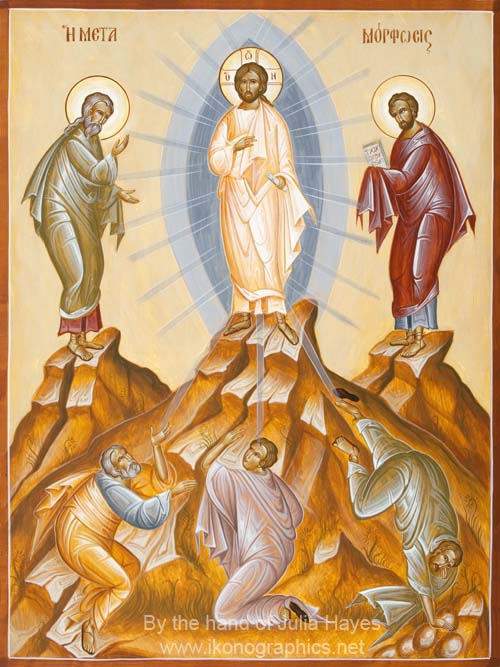 The Feast of the Transfiguration is set as the last of the Lord’s feasts in the liturgical year. As the distinguished liturgist Ioannis Foundoulis notes, this position marks the conclusion of the yearly journey through the events of the Lord’s life. At the same time, it offers a glimpse into the events of the last times: the future coming of Christ, the glory that is to come, and the deification of the human person who is being transfigured in Christ. This is the final goal and purpose of the Savior’s redeeming work.
The Feast of the Transfiguration is set as the last of the Lord’s feasts in the liturgical year. As the distinguished liturgist Ioannis Foundoulis notes, this position marks the conclusion of the yearly journey through the events of the Lord’s life. At the same time, it offers a glimpse into the events of the last times: the future coming of Christ, the glory that is to come, and the deification of the human person who is being transfigured in Christ. This is the final goal and purpose of the Savior’s redeeming work.
The faithful are already drawing near to this future glory through their whole spiritual life, lived within the life of the Church. They are conscious of the truth expressed so vividly by the apostle Paul: “But our commonwealth is in heaven, and from it we await a Savior, the Lord Jesus Christ, who will change our lowly body to be like his glorious body, by the power which enables him even to subject all things to himself” (Phil 3:20–21).
In this present life, our body is a “body of humiliation”; it is subject to sickness, weakness, decay, and pain. But at the Second Coming, our Lord will appear in glory, and then our body will undergo a transformation. It will be stripped of all that is temporary, fragile, and incomplete, and it will be clothed with glorious perfection. It will become “conformed to the body of His glory”—like the glorified body of the God-man Jesus. “It will become like the body that sits at the right hand of the Father,” teaches Saint John Chrysostom emphatically, “like the body that is worshipped by the angels, attended by the bodiless powers—like the body that is above every principality, authority, and power!” The word “will transform” (μετασχηματίσει), notes Theodoret, does not refer to a mere change in outward form, but rather to the body’s deliverance from corruption. The body will be “conformed” to His glory, explains the same interpreter, not in the degree of glory, but in its quality: “for it too shall be radiant with light,” like a body made of light.
This astonishing and inconceivable likeness will be accomplished “by the power which enables Him even to subject all things to Himself.” The almighty Lord has the authority to subdue all things—therefore, He can also subdue corruption and death. He confirmed this hope by raising His own body from the dead.
Concerning this profound transformation that will take place at the Second Coming, we also read in the First Epistle to the Corinthians: “Lo! I tell you a mystery. We shall not all sleep, but we shall all be changed, in a moment, in the twinkling of an eye, at the last trumpet. For the trumpet will sound, and the dead will be raised imperishable, and we shall be changed. For this perishable nature must put on the imperishable, and this mortal nature must put on immortality” (1 Cor 15:51–53).
The apostle Paul reveals a mystery—something hidden—that will take place at the close of the ages: “We shall not all sleep (die), but we shall all be changed.” Not all will die, but all will undergo a transformation. The verb “we shall be changed” here carries the same meaning as “He will transform.” Those who are alive at the time of the Second Coming, the moment the Lord appears in glory, will instantly undergo a transformation. Their corruptible and mortal bodies will become incorruptible and immortal—like the glorious body of the risen Lord! “Corruption will die within them,” explains Saint Theophylact, “and will be transformed into incorruption.”
It is worth noting that, in that hour, the human being will not perish, and the unique personal identity of each will be preserved. Our self will retain the awareness of its own existence. Yet it will regain its lost radiance—the radiance it once had in Paradise before the fall. Just as our Lord, when He assumed human nature, preserved His divinity whole and unchanged—and thus was not mortal, but only liable to suffer—so too, at the Second Coming, the human body will be deified. It will not cease to be our very own human body, but it will be transformed. This same body will be changed and will become incorruptible, immortal, and glorious!
Knowing these things, then, O man,” cries out Saint Andrew of Crete, “do not make yourself unworthy of grace, nor lose the heavenly and eternal things because of a life of indulgence. Instead, put away all laziness of soul and free yourself from every earthly concern. Turn yourself completely toward what is above and heavenly. Embrace the spiritual union with the Word—a pure and blessed union—which brings deification and the enjoyment of inexpressible blessings. Bring your soul and your life there, near to Him. It is a good thing to be with God. That is where the feast of the saints takes place.
The Transfiguration of the Savior (C)
Translated excerpts from the book:
Στεργίου Ν. Σάκκου [Read CV], «Λάμψον καὶ ἡμῖν...», ἐκδ. «ΧΡΙΣΤΙΑΝΙΚΗ ΕΛΠΙΣ» ΟΡΘΟΔΟΞΗ ΑΔΕΛΦΟΤΗΤΑ, Θεσ/νίκη 2023.
Spiritual Transfiguration (part 2)
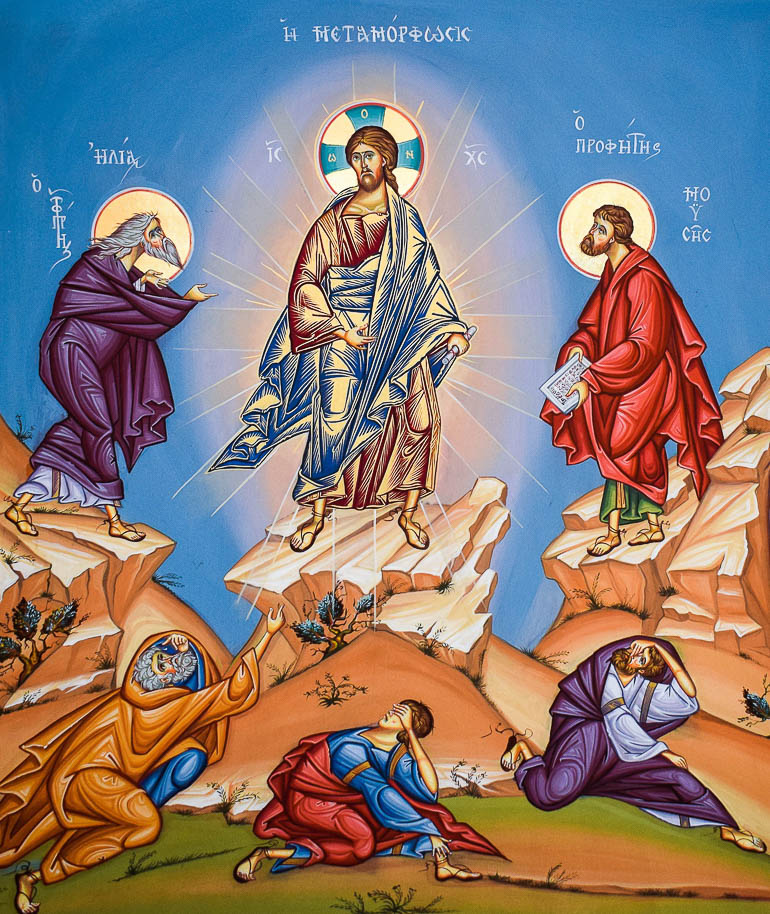 “Resist the devil and he will flee from you,” exhorts James, the brother of the Lord (4:7). We need a spirit of resistance in order to live in this world without falling under the power of its ruler. It is telling that our Lord Jesus Christ, shortly before His departure from this world, prayed for His disciples, asking His Father: “I do not pray that Thou shouldest take them out of the world, but that Thou shouldest keep them from the evil one” (Jn 17:15). He does not pray for them to be taken out of the world, but that they may be guarded from the evil one. Christians will live in the world, interact with it, cooperate with it, and yet guard themselves from the influence of the evil one.
“Resist the devil and he will flee from you,” exhorts James, the brother of the Lord (4:7). We need a spirit of resistance in order to live in this world without falling under the power of its ruler. It is telling that our Lord Jesus Christ, shortly before His departure from this world, prayed for His disciples, asking His Father: “I do not pray that Thou shouldest take them out of the world, but that Thou shouldest keep them from the evil one” (Jn 17:15). He does not pray for them to be taken out of the world, but that they may be guarded from the evil one. Christians will live in the world, interact with it, cooperate with it, and yet guard themselves from the influence of the evil one.
To the command, “Do not be conformed,” the God-inspired Apostle adds, “but be transformed.” The faithful are called not only to refrain from being conformed to this world, but also to be continually transformed in spirit. This implies a constant spiritual perfecting and growth. A standstill is never a good sign—either in the physical life or in the spiritual one. Saint Theophylact gives this counsel: “Do not say, as Peter did, ‘Lord, it is well that we are here’; for one must always make progress and not remain at one level of virtue and contemplation, but move forward elsewhere.” Spiritual advancement—spiritual transformation—is an essential mark of the Christian life.
But how is this vital spiritual transformation attained? The apostle Paul answers: through renewal. In the mystery of Baptism, we were spiritually reborn. We renewed this rebirth of Baptism when we willingly made the decision to belong to Christ—that is, to be conscious members of the Church. Yet that initial renewal is not enough. We must continually renew ourselves spiritually—we must undergo a constant renewal. Saint John Chrysostom advises: “This is exactly what we do with our homes—we are always tending to them when they grow old—do the same with yourself! Have you sinned today? Have you aged your soul? Do not despair, do not lose heart, but renew it through repentance, tears, confession, and acts of mercy—and never cease to do this.” When we neglect to renew ourselves, we begin to lose the battles of the spiritual life.
More specifically, the apostle Paul speaks of the renewal of the mind—that is, of our thoughts, our inner mindset. Through the mystery of Baptism, we have put on Christ (see Gal 3:27) and have been given “the mind of Christ” (1 Cor 2:16) — “Have this mind among yourselves, which is yours in Christ Jesus” (cf. Phil 2:5). Yet through sin the mind becomes clouded, worn down by the passions, aged by vice. “Nothing ages the soul and the body as much as sin,” observes Oecumenius.
This is why we are in constant need of renewal of the mind. “Before all else, our judgment about things must be sound,” teaches the golden-tongued Father. “And even if we do not yet practice virtue, let us at least praise it; and even if we have not yet turned away from evil, let us still condemn wickedness. In this way, we will form upright judgments—and by progressing in this way, little by little, we will also come to put virtue into practice.”
But how, then, is the human mind renewed? Through the truths of the Gospel. Just as the intellect is shaped and instructed through study, so too is the mind reshaped, purified, and illumined through the study of the Holy Scriptures—through the sacred writings. It becomes new, filled with holy thoughts, pure desires, and noble affections. In a homily for the Feast of the Transfiguration, Saint Gregory Palamas urges: “Now pay attention, I ask you, and lift up the eyes of your mind to the light of the Gospel message, so that you may at last be transformed through the renewal of your mind!”
Once the mind has been renewed, it acquires the precious virtue of discernment—the ability to recognize what the will of God is in every situation: “that you may prove what is the will of God, what is good and acceptable and perfect.” (Rom 12:2) “Discernment is greater than all other virtues,” teaches Saint Isaac the Syrian. With discernment, the believer sees all things in the light of eternity —to see with the very eyes of God. He comes to know the divine will and strives to live it out in his daily life, submitting himself to the command spoken by the heavenly Father at the Transfiguration: “Listen to Him.” (Mt 17:5) Through this obedience, he is continually refined, uplifted, and spiritually transformed.
